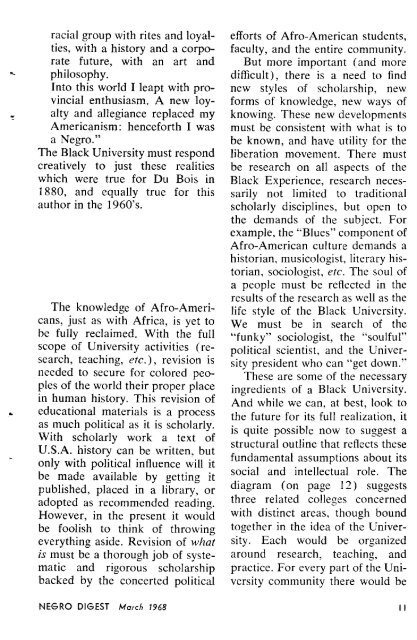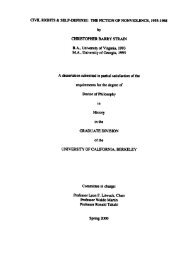Negro Digest - Freedom Archives
Negro Digest - Freedom Archives
Negro Digest - Freedom Archives
You also want an ePaper? Increase the reach of your titles
YUMPU automatically turns print PDFs into web optimized ePapers that Google loves.
acial group with rites and loyalties,<br />
with a history and a corporate<br />
future, with an art and<br />
philosophy .<br />
Into this world I leapt with provincial<br />
enthusiasm . A new loyalty<br />
and allegiance replaced my<br />
Americanism : henceforth I was<br />
a <strong>Negro</strong> ."<br />
The Black University must respond<br />
creatively to just these realities<br />
which were true for Du Bois in<br />
1880, and equally true for this<br />
author in the 1960's .<br />
The knowledge of Afro-Americans,<br />
just as with Africa, is yet to<br />
he fully reclaimed . With the full<br />
scope of University activities (research,<br />
teaching, etc.), revision is<br />
needed to secure for colored peopies<br />
of the world their proper place<br />
in human history . This revision of<br />
educational materials is a process<br />
as much political as it is scholarly .<br />
With scholarly work a text of<br />
U .S.A . history can be written, but<br />
only with political influence will it<br />
be made available by getting it<br />
published, placed in a library, or<br />
adopted as recommended reading .<br />
However, in the present it would<br />
be foolish to think of throwing<br />
everything aside . Revision of what<br />
is must be a thorough job of systematic<br />
and rigorous scholarship<br />
backed by the concerted political<br />
NEGRO DIGEST March 19E8<br />
efforts of Afro-American students,<br />
faculty, and the entire community .<br />
But more important (and more<br />
difficult), there is a need to find<br />
new styles of scholarship, new<br />
forms of knowledge, new ways of<br />
knowing . These new developments<br />
must be consistent with what is to<br />
be known, and have utility for the<br />
liberation movement . There must<br />
be research on all aspects of the<br />
Black Experience, research necessarily<br />
not limited to traditional<br />
scholarly disciplines, but open to<br />
the demands of the subject . For<br />
example, the "Blues" component of<br />
Afro-American culture demands a<br />
historian, musicologist, literary historian,<br />
sociologist, etc . The soul of<br />
a people must be reflected in the<br />
results of the research as well as the<br />
life style of the Black University .<br />
We must be in search of the<br />
"funky" sociologist, the "soulful"<br />
political scientist, and the University<br />
president who can "get down ."<br />
These are some of the necessary<br />
ingredients of a Black University .<br />
And while we can, at best, look to<br />
the future for its full realization, it<br />
is quite possible now to suggest a<br />
structural outline that reflects these<br />
fundamental assumptions about its<br />
social and intellectual role . The<br />
diagram (on page 12) suggests<br />
three related colleges concerned<br />
with distinct areas, though bound<br />
together in the idea of the University<br />
. Each would be organized<br />
around research, teaching, and<br />
practice . For every part of the University<br />
community there would be
















